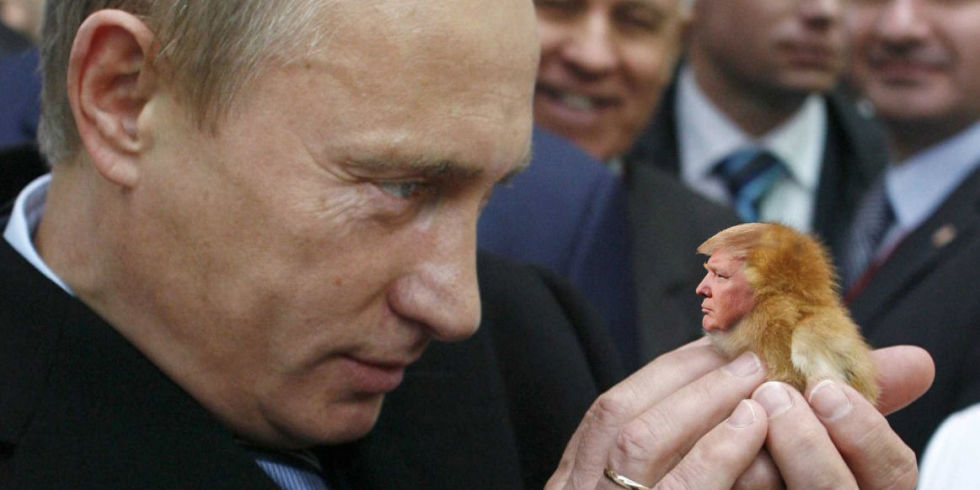 We're all shocked, astonished, etc, that Donald Trump won the 2016 US Presidential Elections. The prospect of Donald Trump as US President goes completely against the grain, and is not what'd been expected, but at the same time we shouldn't be surprised. It did happen, and we must look for an effective way to deal with this fact, including fighting strongly against all the crazy stuff that we know is coming. However there is a larger picture in that Trump was not the only Putin/Russia-friendly President to be elected in the last week.
We're all shocked, astonished, etc, that Donald Trump won the 2016 US Presidential Elections. The prospect of Donald Trump as US President goes completely against the grain, and is not what'd been expected, but at the same time we shouldn't be surprised. It did happen, and we must look for an effective way to deal with this fact, including fighting strongly against all the crazy stuff that we know is coming. However there is a larger picture in that Trump was not the only Putin/Russia-friendly President to be elected in the last week.
In Moldova, Igor Dodon won the Presidency beating Maia Sandu. Dodon is extremely Russia-friendly, and promised one of the first things he'd do is travel to Moscow to meet with Putin. By contrast, Sandu's career includes graduate level training in American Universities, and several years working at the World Bank, and it should not be surprising she promised greater cooperation with the European Union. Sandu faced wide-ranging criticism, especially from the Bishop of the Moldovan Orthodox Church (which is under the hierarchy of the Russian Orthodox Church, unlike the Bessarabian Orthodox Church which is under the hierarchy of the Romanian Orthodox Church). Bishop Marchel's criticism was so bad that Sandu quipped that it must now be a sin to be a woman. I've been tracking the news about Moldova for months, and this fits a pattern where Russian's have been flagrantly manipulating Moldova's politics.
Moldova's history between Romania and Russia is complicated -- one of the first steps of WW 2 was when Russia invaded Romania taking the land north of the River Prut. That land is what's now the country of Moldova, and it underwent decades of Russiaification. While most of Romania wants to reintegrate with Moldova, opinion appears to be uncertain in Moldova itself.
In Bulgaria, I don't know the situation so well. Rumen Radev was elected also on a pro-Russia platform. He's described as a former Bulgaria Air Force pilot, and a newcomer to politics. According to Reuters, Radev has not called for Bulgaria to exit from its association with the EU, and that Radev's hope is that Trump will lead to a better dialogue with Russia. "In his election campaign (Donald Trump), already elected, said clearly that he will work for a better dialogue with Russia. That gives us hope, a big hope, for a peaceful solution to the conflicts both in Syria and in Ukraine and for a decrease of the confrontation," Radev said.
In both countries an issue is anger at corruption, and that the governments of both countries did little to fix that problem. That leaves me scratching my head, that they're turning to Russia to fix problems with corruption? What are they smoking?
A geopolitical issue with Bulgaria has to do with Baltic Sea defense in the face of Russia's aggression. Romania had attempted to lead the formation of cooperation between Naval forces of Turkey, Bulgaria Romania, and perhaps Ukraine. Obviously they're all facing a threat from Russia and wanted to present a unified front. A few months ago Bulgaria backed out of that plan, which obviously threw in a monkey wrench.
What about Trump? One of his first actions as President-elect was to call Russian President Vladimir Putin. They discussed “reversing towards pragmatic, mutually beneficial cooperation that would satisfy the interests of both countries, promote stability and safety around the world,” and that Trump is “very much looking forward to having a strong and enduring relationship with Russia and the people of Russia.” Such a move would be an about-face of enormous proportions given the recent history between the US, the EU, NATO, and Russia. We've been just shy of open warfare with Russia for quite some time.
Arizona Sen. John McCain warned Trump against resetting relations with Russia. There should be many more political voices warning Trump against becoming friendly with Russia. Russia has been positioned for years as a major threat to Europe and the US, and I think there's lots of evidence to support that idea.
During the campaign lots of evidence surfaced that Trump's campaign was getting support from Russia. In particular, there was a series of "Hacking" incidents against Democratic Party and Clinton Campaign computer infrastructure, and later Wikileaks released a load of private e-Mail correspondence between Clinton campaign insiders. How did Wikileaks get those emails? Did Russian hackers get them, and then pass those emails over to Wikileaks? The effect of those leaked e-mails is unquantifiable but surely swayed some people away from Clinton. A few days ago, following the election, Admiral Michael Rogers, Commander of the US Cyber Command and Director National Security Agency, said that a "nation-state" consciously targeted Hillary Clinton's campaign in order to affect the US Election. “There shouldn’t be any doubt in anybody’s minds, this was not something that was done casually, this was not something that was done by chance, this was not a target that was selected purely arbitrarily. This was a conscious effort by a nation-state to attempt to achieve a specific effect,” he said. He did not name that nation-state, but in October the NSA issued a statement accusing Russian hackers of such activity.
In other words, it's extremely likely that Russia tried to manipulate the US election and cause Donald Trump to be elected.
If that's true - we should all be very worried.
